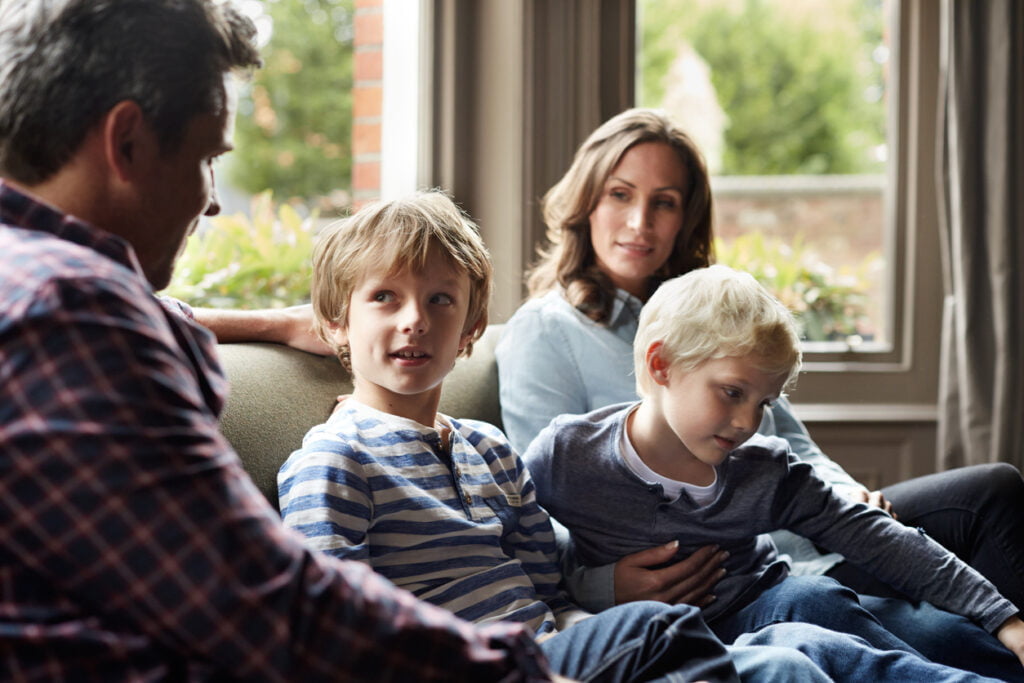
Divorcing couples sometimes become so focused on the issues between them that they almost forget about other members of the family and how the divorce may be seriously affecting them. Children, of course, are a very important part of the family. They need to be told what’s going on in a manner that is considerate and supportive.
Here are three factors that help children of any age adjust after divorce:
The following are 10 tips to help with breaking the news of the divorce to the children:
1. Present a United Front.
Although you and your soon-to-be ex-spouse may be united on very few topics with a divorce pending between you, you should tell your child or children about the divorce as a team. This will convey that it’s a mutual decision and avoid the children from hearing only one person’s version of why their parents are divorcing. Psychologists maintain that breaking the news together also helps preserve your child’s sense of trust in both parents and also shows them you are both still united when it comes to loving them and providing for them.
2. Address the Entire Family.
It’s also important to tell all of the children at the same time. You want them to hear the news directly from Mom and Dad, not from a sibling who’s heard it first. If kids are in different age groups, share the basic information at the initial gathering and follow up with the older children in a separate conversation. It is likely they will have more detailed questions about what is going on.
3. Be Aware of Timing.
There’s never a perfect time to deliver bad news, although on some occasions a divorce may be good news if there has been a lot of strife in the family. However, bad times to deliver such serious news include school days, right before a parent heads off to work, or just before bed. When a child hears the news that his family is splitting up, he or she may feel unsafe and alone. She will need her parents to be there for her to help her cope with the situation. After all, there’s going to be a big change in the life the children have known up to this point.
4. Plan What You Are Going To Say.
You need to have a conversation with your former partner before telling the kids about the divorce. You may even practice what you are going to say. You don’t want to get into an argument in front of the children while you are breaking the news. If you both realize that you won’t be able to handle the discussion together, you might consider using the services of a mediator or counselor or invite someone you both trust to help work out the details.
You might begin by explaining that adults sometimes change the way they love each other and are unable to agree on things. So, the adults must live apart for things to go better for everyone.
You may add that sometimes parents and children don’t agree on things also, but they never stop loving each other. They have different kinds of relationships. They can’t get divorced. Later in life, the kids may live in a different location than their parents, but they are always loved and will be taken care of by their parents until they are grownups.
5. Be Open To Questions.
Depending on the age of your child, be prepared to answer at least some of these questions:
You should probably anticipate answers to some of the questions in the discussion you have with your former partner before you tell the children about the divorce. It will be very important to tell them where the departing parent will be living and when they will be seeing that parent. A temporary visitation schedule should already have been worked out.
If either parent doesn’t know the answer to a question, be honest and tell the child you will let them know. This is not a good time to make long-range promises about the future as things are probably a bit uncertain. Stick with sharing hugs and affection in the present time.
6. Expect a Mixed Bag of Interactions.
Some children will express fear, worry, or even relief when they hear the news of the impending breakup. How they react depends on their age, personality, and the circumstances of the separation and divorce. Some kids may seem to have no reaction but will want to talk later. Others will plead with their parents to change their minds and they must be told this is no longer an option.
Stress often comes out in other ways with changes in the child’s appetite, behavior, or sleep patterns. Although the initial reaction may be one of shock, frustration, or anger, children often come out of such situations better able to cope with stress. Reassure them that all of their feelings are understandable and perfectly OK.
7. Help Your Children Realize They Are Not To Blame.
As well as trying to blame themselves for what has happened, children might try to assume the responsibility for trying to fix the problem. They need to be reassured divorce is an adult decision and has nothing to do with them. It is also a good idea not to use words like “fault” or “blame” directed at each other when trying to explain what has brought about the divorce. No child should be made to feel he must choose sides in disagreements between his parents.
8. Minimize Disruption of Daily Routines.
Keeping life consistent rather than erratic help when dealing with a big change in your daily routine, according to kidshealth.org. If a child is taking ballet lessons or playing baseball, do everything you can to keep these activities going. If you can no longer drive them due to work or because you live out-of-town, make arrangements to have this accomplished in some manner.
9. Keep The Other Parent Involved.
Although it may be difficult to cooperate with someone you are divorcing, you should do everything you can to make visits between the children and their father or their mother as free of conflict as possible. It will comfort the child to know he’ll continue to see both parents and there’s a plan for that. When children are spending time with the other parent, this is not the time for heated discussions or legal talk, it’s a time to make an effort to support and encourage the other’s relationship with the children you share. Conflict will adversely affect all involved.
10. Keep It Simple and Age Appropriate.
Your children don’t need to know—and most won’t understand—the personal details of the divorce so don’t give them unnecessary information. They will need a general explanation and a few specific details which should include enough information to prepare them for upcoming changes in their lives. Here is a guide from todaysparent.com as to what is appropriate for various ages of children.
Babies and Toddlers (ages 0 to 3 years)
These children are dependent on caregivers or parents and have no ability to understand complex events or anticipate future situations so the simplest of explanations is all that needs to be given.
Preschoolers (ages 4 to 5 years)
These children are beginning to develop independence but are still highly dependent. They have limited ability to understand cause and effect and think little about the future, if at all. Their understanding of the world revolves around themselves, and the line between fantasy and reality is sometimes fuzzy. There is some ability to think about feelings but a limited ability to talk about them.
They can still experience stress about the situation and have nowhere to escape their home environment as preteens and teenagers do. These children need consistent care and nurturing to give them a sense of stability and very simple explanations about what is happening.
Children Ages 6 to 8 years
These children have a little more ability to think and talk about feelings than younger children and are developing relationships outside the home. They have a broader view of what’s going on around them and are not so self-involved, but they still have a limited understanding of complex circumstances such as divorce. Answer their questions but keep it simple.
Children Ages 9 to 11 years
These children have a more developed ability to understand and to think and talk about feelings and circumstances related to divorce. They tend to see things in black and white and may assign blame for the split. Relationships outside the family (friends, teachers, coaches) are more developed and become a greater factor in how the child spends his time. You can give these children more information about what is going on.
Children Ages 12 to 14 years
These children have the ability to take part in discussions and ask questions to increase their understanding. Relationships outside the family are increasingly important. They have the beginnings of a desire for more independence and may question parental authority. Thus, they have a greater capacity to understand issues related to divorce.




